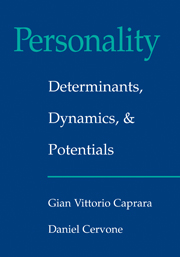Book contents
- Frontmatter
- Contents
- Preface
- PART ONE INTRODUCTION TO PERSONALITY PSYCHOLOGY
- PART TWO DESCRIPTION AND EXPLANATION
- PART THREE THE DEVELOPMENT OF PERSONALITY
- Introduction: The Development of Personality
- 5 Personality Development Across the Course of Life
- 6 Genetics, Brain Systems, and Personality
- 7 Interpersonal Relations
- 8 Social Contexts and Social Constructions
- PART FOUR THE DYNAMICS OF PERSONALITY
- PART FIVE EPILOGUE
- References
- Author Index
- Subject Index
7 - Interpersonal Relations
Published online by Cambridge University Press: 04 February 2011
- Frontmatter
- Contents
- Preface
- PART ONE INTRODUCTION TO PERSONALITY PSYCHOLOGY
- PART TWO DESCRIPTION AND EXPLANATION
- PART THREE THE DEVELOPMENT OF PERSONALITY
- Introduction: The Development of Personality
- 5 Personality Development Across the Course of Life
- 6 Genetics, Brain Systems, and Personality
- 7 Interpersonal Relations
- 8 Social Contexts and Social Constructions
- PART FOUR THE DYNAMICS OF PERSONALITY
- PART FIVE EPILOGUE
- References
- Author Index
- Subject Index
Summary
In our previous two chapters we have construed personality development as a lifelong, dynamic process. A person's psychological qualities reflect a continual process of interaction among three elements: the biological being whose genetic endowment partly determines his or her preferences and capacities; the sociocultural environment, whose conceptual systems and environmental settings facilitate some developmental pathways while inhibiting others; and the agentic individual, who causally contributes to the course of his or her development through the human capacities for forethought and self-regulation.
In the present chapter, we consider how personality development is shaped and sustained by interpersonal factors. Although interpersonal settings at first sound as if they are merely an aspect of the sociocultural environment, in reality their nature and influence reflects all three of the factors noted above. Biological endowment influences interpersonal interactions in that different temperaments elicit different reactions from others (Plomin et al., 1997). Cognitive, agentic factors are important in that people strategically influence the course of interactions and, with increasing age, select the interpersonal relations that constitute their social life. Finally, interpersonal relations achieve meaning within social and cultural contexts; indeed, they are a primary vehicle through which the sociocultural environment influences the individual.
The metaphor of a dialogue is frequently employed to capture relations among the biological, cultural, and personal determinants of development. As in a dialogue, developmental factors influence one another reciprocally and evolve continually over time. In the case of personality, dialogue actually is more than a metaphor.
- Type
- Chapter
- Information
- Personality: Determinants, Dynamics, and Potentials , pp. 187 - 207Publisher: Cambridge University PressPrint publication year: 2000



